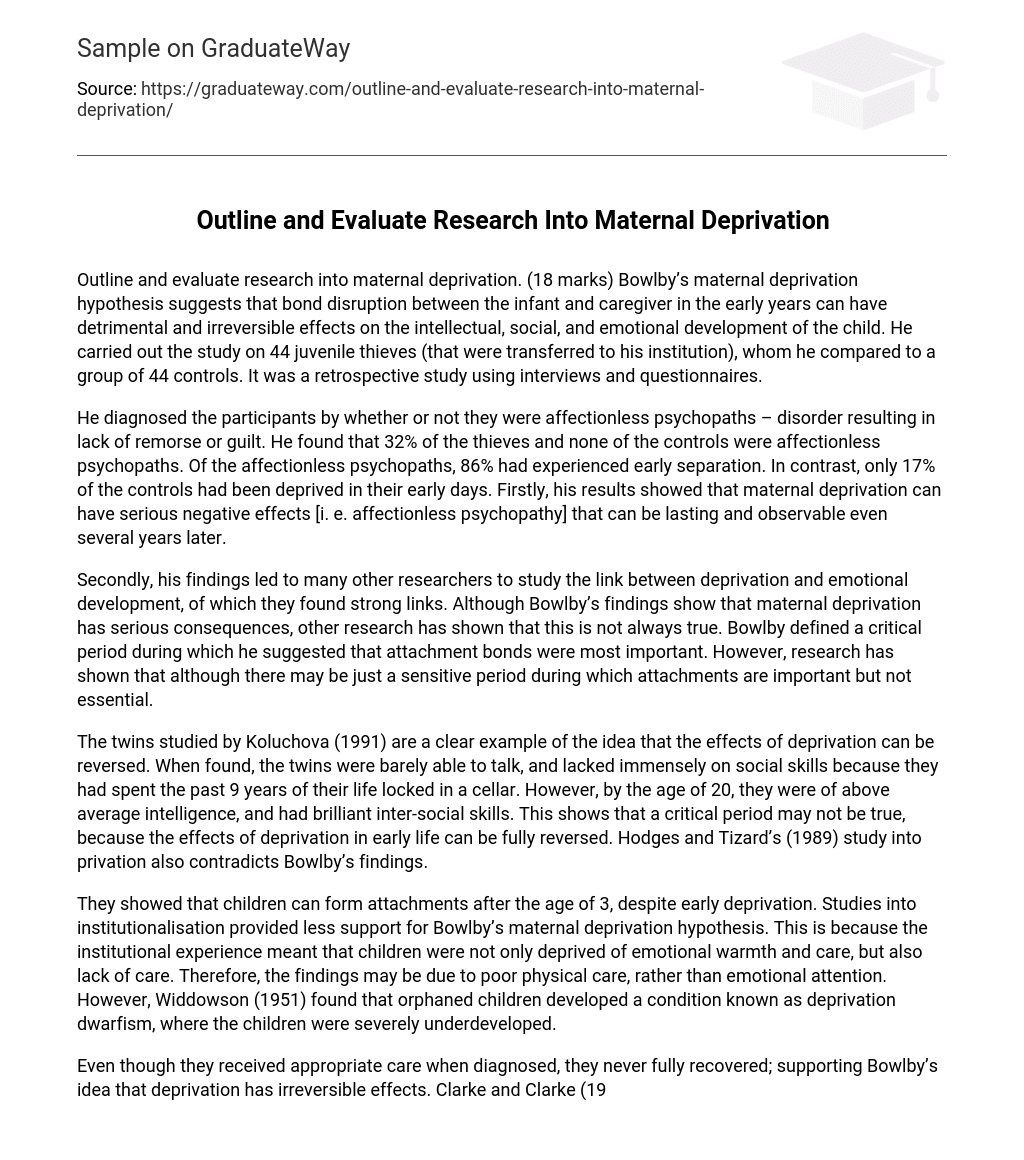Outline and evaluate research into maternal deprivation. (18 marks) Bowlby’s maternal deprivation hypothesis suggests that bond disruption between the infant and caregiver in the early years can have detrimental and irreversible effects on the intellectual, social, and emotional development of the child. He carried out the study on 44 juvenile thieves (that were transferred to his institution), whom he compared to a group of 44 controls. It was a retrospective study using interviews and questionnaires.
He diagnosed the participants by whether or not they were affectionless psychopaths – disorder resulting in lack of remorse or guilt. He found that 32% of the thieves and none of the controls were affectionless psychopaths. Of the affectionless psychopaths, 86% had experienced early separation. In contrast, only 17% of the controls had been deprived in their early days. Firstly, his results showed that maternal deprivation can have serious negative effects [i. e. affectionless psychopathy] that can be lasting and observable even several years later.
Secondly, his findings led to many other researchers to study the link between deprivation and emotional development, of which they found strong links. Although Bowlby’s findings show that maternal deprivation has serious consequences, other research has shown that this is not always true. Bowlby defined a critical period during which he suggested that attachment bonds were most important. However, research has shown that although there may be just a sensitive period during which attachments are important but not essential.
The twins studied by Koluchova (1991) are a clear example of the idea that the effects of deprivation can be reversed. When found, the twins were barely able to talk, and lacked immensely on social skills because they had spent the past 9 years of their life locked in a cellar. However, by the age of 20, they were of above average intelligence, and had brilliant inter-social skills. This shows that a critical period may not be true, because the effects of deprivation in early life can be fully reversed. Hodges and Tizard’s (1989) study into privation also contradicts Bowlby’s findings.
They showed that children can form attachments after the age of 3, despite early deprivation. Studies into institutionalisation provided less support for Bowlby’s maternal deprivation hypothesis. This is because the institutional experience meant that children were not only deprived of emotional warmth and care, but also lack of care. Therefore, the findings may be due to poor physical care, rather than emotional attention. However, Widdowson (1951) found that orphaned children developed a condition known as deprivation dwarfism, where the children were severely underdeveloped.
Even though they received appropriate care when diagnosed, they never fully recovered; supporting Bowlby’s idea that deprivation has irreversible effects. Clarke and Clarke (1976) suggested that the relationship between hospitalisation and later maladjustment may be due to general home problems. They suggested that disadvantaged children would be more likely to end up in hospitals, so their behaviour may be due to their domestic problems rather than insecure attachments in early life. Bowlby has also been criticised for his maternal deprivation hypothesis being too vague.
He does not distinguish between separation and deprivation or long term and short term effects. Furthermore, he almost ignored individual differences, and the idea of multiple attachments – that the child can be securely attached to other people besides the primary caregiver. However, Bowlby has also gained praise for the lasting effects that his research has had on society. His findings were critical for the beginning of the children’s movement, and he is to thank for children’s rights and protection in contemporary society.





